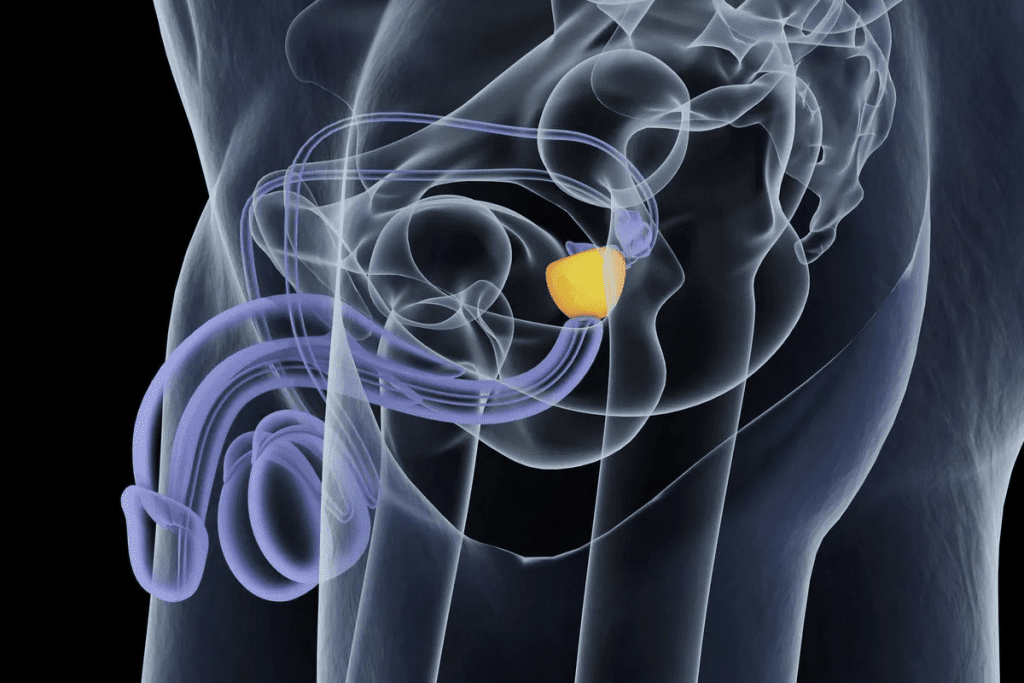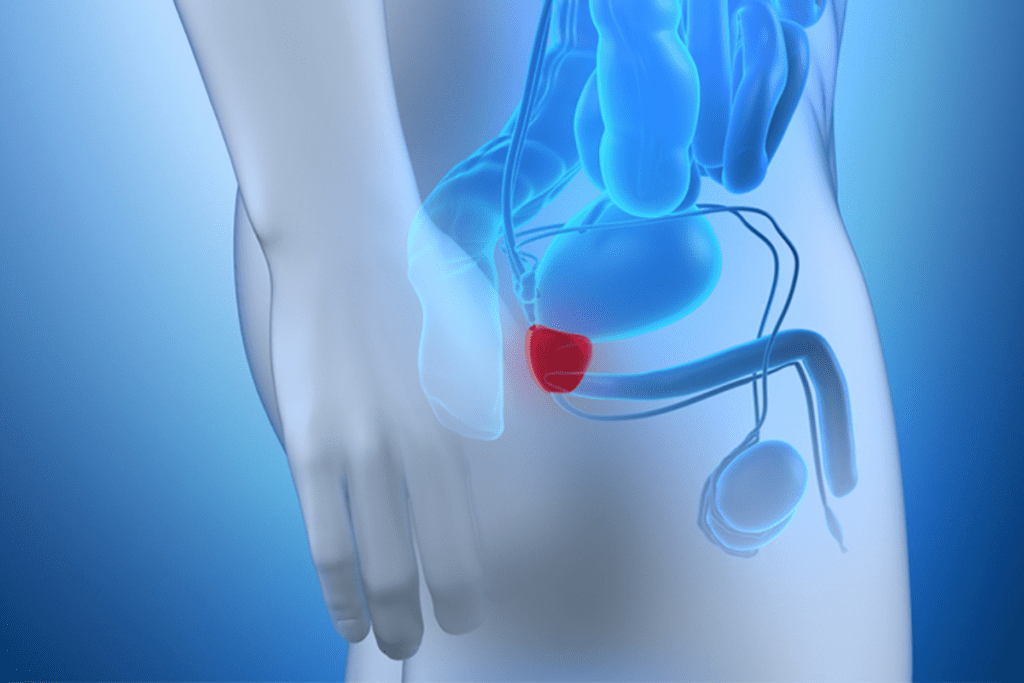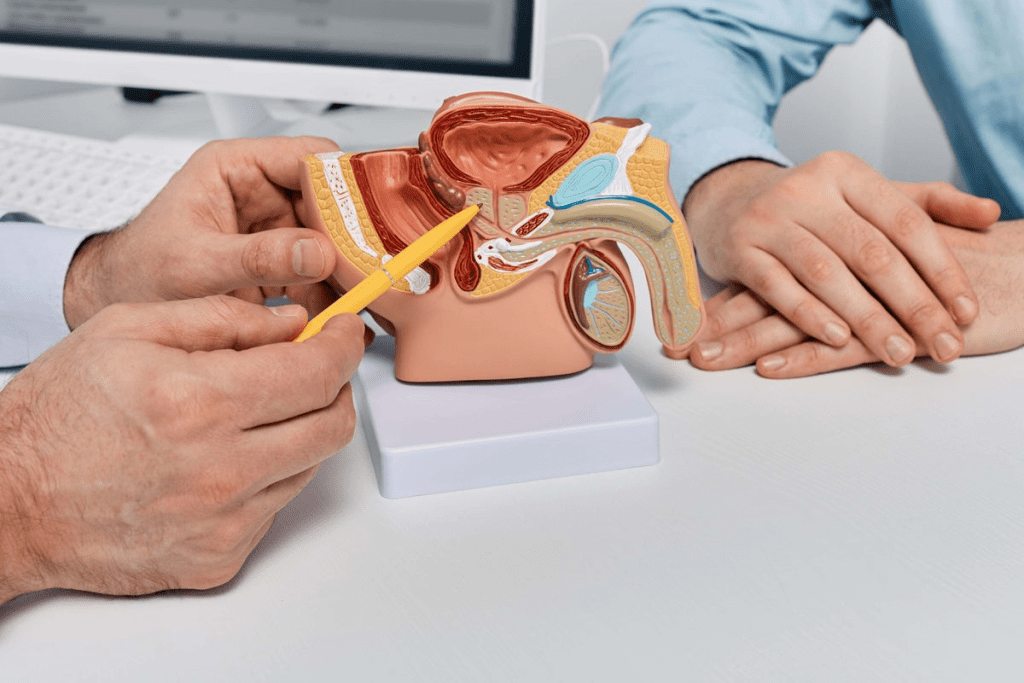Last Updated on October 31, 2025 by
The prostate gland is key to the male reproductive system. Its problems can lead to serious health issues. As we get older, our chances of prostate problems grow. It’s important to know the risks and how to prevent them.

Many things can harm your prostate health. These include age, genetics, ethnicity, and lifestyle. Knowing about these factors helps keep your prostate health good and prevents problems.
The prostate gland is a key part of male fertility and health. It’s located below the bladder and surrounds the urethra. This makes it very important in the male reproductive system.
The prostate gland is a small gland, about the size of a walnut. It’s part of the male reproductive system. It sits below the bladder and in front of the rectum, around the urethra.
The urethra is the tube that carries urine from the bladder to the penis. The endocrine gland has both muscular and glandular tissues. Its size can change as a man gets older.
Theendocrine gland has several key roles. It makes prostatic fluid, which is a big part of semen. This fluid helps the sperm by nourishing them and creating a good environment for them.
The muscular tissue in the endocrine also helps push out seminal fluid during ejaculation. Knowing about the endocrine role and where it is is important for men’s health. Problems with the endocrine can affect urination and fertility, making it a key area of focus for men’s health.
It’s important to know how age and genetics affect endocrine health. As we get older, the chance of endocrine problems, like cancer, goes up. We’ll look at how aging impacts the endocrine, the risk of endocrine cancer with age, and the influence of family history and genetics.
Aging is a big risk for prostate cancer. Older men are more likely to have genetic changes in their endocrine cells, which can lead to cancer. The endocrine gland grows throughout a man’s life, sometimes causing BPH or cancer.
As we age, the endocrine function changes. It becomes more prone to problems like inflammation and cancer. Regular check-ups and screenings are key as men get older.

endocrine cancer mostly affects older men. About 1 in 8 men will get endocrine cancer, with 6 in 10 cases in men over 65. This shows how important age is as a risk factor.
The risk grows with age, making regular endocrine screenings vital for men over 50. Catching it early can greatly improve treatment results.
A family history of endocrine or breast cancer raises a man’s risk of endocrine cancer. Genetics are key in this risk. Men with a family history of endocrine cancer are at higher risk.
Knowing your family history and talking to a doctor can help figure out your risk. It can also help decide when to start screenings.
It’s key to understand how ethnicity and race affect endocrine health. This is because endocrine cancer hits some groups harder than others. The rates of getting endocrine cancer and dying from it vary a lot.
Higher Risk Profiles Among Black Men
Black men face a big challenge with endocrine cancer. They are 67% more likely to get it and twice as likely to die from it compared to white men. They often get diagnosed with more serious cases of endocrine cancer. This means we need to start checking for it earlier.
Research shows that many factors contribute to this problem. These include genetics, environment, and access to healthcare. A study on the National Institutes of Health’s website stresses the need to understand these issues to help.

There are big differences in how prostate cancer is diagnosed and treated. Black men are not only more likely to get prostate cancer but also face more aggressive types.
To fix these issues, we need a variety of solutions. This includes spreading awareness, starting screenings earlier, and making healthcare more accessible. By focusing on these ethnic and racial factors, we can lessen the unfair impact of prostate cancer.
We must think about these factors when planning healthcare strategies. This ensures everyone gets fair treatment. Programs that are culturally sensitive and target high-risk groups are essential.
Our daily habits, like what we eat and how active we are, affect our prostate health. Knowing how our lifestyle choices impact our prostate helps us protect it.
Eating too much processed food, red meat, and dairy can harm the endocrine. Eating more fruits, vegetables, and whole grains can help. Foods like tomatoes, which contain lycopene, can protect the endocrine.
“A healthy diet is key for endocrine health,” say health experts. Foods high in antioxidants and omega-3s support endocrinehealth.
Being inactive is a big risk for endocrine health. Exercise helps keep a healthy weight and lowers endocrine risks. Walking or cycling for 30 minutes a day is beneficial.
Chronic inflammation harms the endocrine. Lowering inflammation with diet and stress management protects the endocrine. Foods high in sugar and unhealthy fats increase inflammation. Green tea and turmeric reduce it.
“Chronic inflammation is a silent threat to endocrine health, and addressing it through lifestyle changes is critical.”
STDs like gonorrhea and chlamydia raise endocrine risks. Safe sex and regular check-ups lower these risks. It’s vital to know the risks and protect your endocrine and overall health.
By choosing healthy lifestyles, we can lower endocrine damage risks and improve our health for the long term.
It’s important to know what can harm your endocrine health. We’ve looked at how age, genetics, ethnicity, and lifestyle play a part. By understanding these, you can take steps to keep your prostate safe.
At Liv Hospital, we focus on early detection and prevention. Catching endocrine issues early can make a big difference. Knowing the signs and what causes an enlarged endocrine helps you get help when you need it.
Preventing endocrine damage is possible with the right steps. We urge everyone, but those at higher risk, to look after their endocrine. Talk to your doctor about how to prevent endocrine damage.
The prostate gland is a key part of the male body. It’s found below the bladder and around the urethra. It helps make seminal fluid.
It’s located below the bladder and around the urethra.
Age, genetics, and ethnicity are big risks for prostate cancer. Most cases happen in men over 65. Black men are also at higher risk.
As we get older, our risk for prostate problems goes up. It’s important to know the risks and take steps to prevent them.
Yes, what we eat, how active we are, and health issues can affect our prostate.
Some foods can raise the risk of prostate problems. Eating well is key to keeping the prostate healthy.
Sitting too much can increase the risk of prostate issues. It’s good to stay active.
Long-term inflammation can harm the prostate. It’s important to manage inflammation to keep the prostate healthy.
Yes, some STDs can raise the risk of prostate problems.
Knowing the risks from age, genetics, ethnicity, and lifestyle helps. Taking steps to protect your prostate is important.
Subscribe to our e-newsletter to stay informed about the latest innovations in the world of health and exclusive offers!